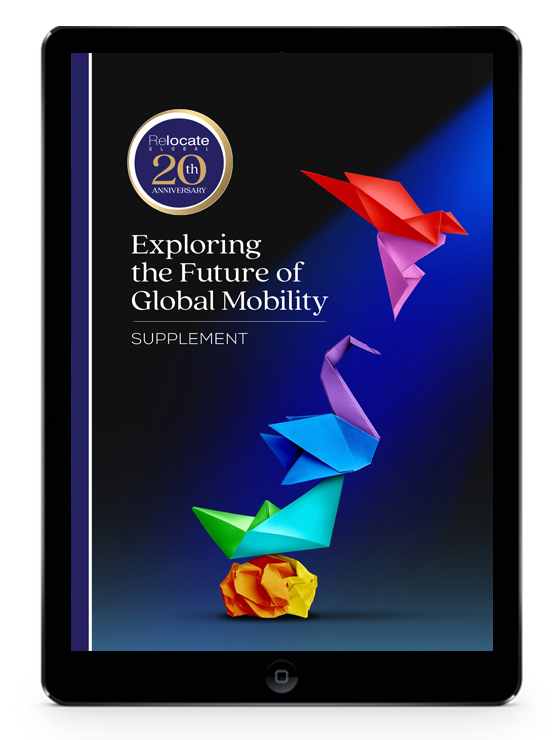Split family and fly-in, fly-out expatriation: Practical support
Research has consistently shown that employees undertaking non-traditional unaccompanied assignments still require support from their organisations. Dr Sue Shortland explains the importance of helping assignees and their families involved in single-status assignments.
Increasing political unrest and the trend towards organisations setting up operations in developing economies have led to greater numbers of families undertaking split expatriation and fly-in, fly-out (FIFO) types of global mobility. The pandemic also resulted in many families being separated for periods far longer than intended before re-unification was possible. Post-pandemic, more individuals are willingly entering into split family/FIFO types of mobility. This may be to maintain dual careers, local risks affecting the deployment of family members to the host location, financial reasons, children’s schooling, elder care, and non-assigned family members maintaining extended-family relationships in the home country.
For employers, unaccompanied mobility has less cost attached to it as it involves only the relocation of the assignee, not the whole family. Single-status assignments thus have a number of benefits.
However, split-family expatriation creates considerable stress. Frequent international work-related travel does likewise, both for the assignee and family members. Research indicates that poor work-life balance can result from individuals being separated from their families. Single-status assignees often elect to work longer hours to combat loneliness and isolation. Frequent international travel also causes work-life balance issues and family disruption from frequent comings and goings.
Organisational support
Organisational support for single-status and FIFO assignments tends to be more limited than that provided for traditional family-accompanied mobility. It tends to focus on only the assignee being moved with little attention paid to family members remaining at home. Yet when families are split apart, the partner who remains at home has to manage all household and work duties alone and support children who have remained in the home country. Organisational support is required both by the assignee, who operates alone in the host country, and by family members left in the home location.
Assignees living alone on single-status assignments suffer from a lack of familial support in the adjustment process. This can affect their performance and productivity. Hence, they require additional organisational support to gain cultural competence and settle in as they need to achieve these actions without the support that an accompanying family can provide. For example, when assignees go abroad and take children with them, support is often forthcoming through the school community. Assignees going solo have no such support access.
Organisations might address this by going beyond cultural training to provide links to local community support networks and employee resource groups, which can embrace the assignee and provide a source of personal support and friendship.
Introducing assignees to buddy partners and local networking groups can prove to be very valuable in this regard. Support can also be given through interventions such as networking events within the company. Flexibility in terms of time off to attend external networking and support group events is also valuable. Introductions to local services, clubs and events can also help to ease isolation and loneliness. Employees should also have access to counselling services and employee assistance programmes.
Family reunification
When individuals relocate alone, reconnection with their family becomes extremely important. Organisations might consider additional reunification visits that go beyond the prescribed home-leave policy. It might also be possible for the family to visit the assignee in the host location and support for this can also be considered. Extension of home leave, where the employee spends additional time working in the home country with their family, can also help to maintain family relationships.
Although attention has been paid in the literature to the assignee’s side of the story, little has been given to the effect of separation on the partner and family who remain at home. Support for family members separated from their loved ones can take the form of counselling and access to employee assistance programmes. These services are typically made available to the assignee, but also providing access to family members who remain at home can help ease their sense of isolation.
FIFO working
Specific focus also needs to be given to assignees and families involved in FIFO arrangements. Frequent international travel is both tiring and stressful to employees. It is also highly disruptive to family relationships. Families report that they settle into a routine without the presence of the assignee only to find that this is disrupted when the assignee returns home for a short period before flying back out to the host location. This is not to say that families do not welcome seeing their loved ones returning home, but routines are altered and sadness can be created when the time comes for the assignee to depart once again.
Relationships are not the same as they were prior to assignment and the efforts couples make to rebuild their routines are hampered by tiredness and jetlag from the assignee’s frequent travel. Employers should consider the pattern of FIFO work to try to minimise disruption as far as possible and exhaustion through overly frequent travel.
Regular patterns of FIFO working tend to work better. Employees who undertake rotational patterns of work, for example, report that they find these to be more compatible with family relationships due to the predictability of the travel pattern. Research has shown that commuter assignments where the pattern of travel abroad is unpredictable are the most difficult for individuals and families to manage. Organisations should carefully consider the pattern of travel used, marrying this up not only with the needs of the job, but also with family stability.
Work/family spill-over effects
In the case of single-status and FIFO assignments, organisations should also consider the spillover effects across the work-family interface. When individuals are reunited with their families for brief periods, part of the catch-up process will be to discuss what has been happening in the working lives of each partner and the school lives of the children. Spillover of work-related conversations into the relationship reunification can fill considerable amounts of time as partners catch up with each other on work developments. While this is a natural process, it leaves less time for other conversation and relationship building on issues that differ from workplace and employment discussions.
This provides an argument for longer periods of family reunification. Multiple short reunification periods can prove ineffective. This is not only due to the travel time involved compared with actual time spent as family, but also because there is insufficient time for the family members to involve themselves in their own interests and concerns, rather than simply catching up on work and schooling developments. A balance needs to be struck between the reality of the workplace environment and the need for physical presence of the assignee, and time that can realistically be spent at home with family members.
Physical and mental health concerns
Employers should also be aware of the negative physical and mental health impacts that single-status and FIFO work arrangements can have. These include fatigue, loneliness, isolation, sadness and even suicide risk. Health issues include poor diet, alcoholism and drug dependency. Physical and mental health issues can affect both the assignee and the stay-at-home partner.
Efforts must be made to ensure good communication between assignees and their home country-based family members. While this might sound like an unnecessary piece of advice, it is worth bearing in mind that not all remote and developing locations have good internet connection and the ability to make regular video calls is not a given.
Organisations should consider means by which flexibility within the assignment can be introduced to enable families to reunite for sensible periods of time and enable relationship normality to be achieved. This includes ensuring that communication links can be put in place for family contact while the assignee is away from home.
Remote working
Remote work has become very popular since the pandemic. Assignees may request to carry out part of their duties outside of the assignment location; for example to extend home leave and work remotely.If such remote working is possible in the context of the assignment, this might be considered under a remote working policy. Organisations will need to ensure that compliance issues are considered (tax and immigration, for example). Limits may need to be applied on the amount of time that can be spent away from the host location for operational and compliance reasons. Thought should also be given to equity with local employees and other assignees such that any remote work that is permitted does not have a detrimental effect on staff relationships and leadership capability.As split-family expatriation becomes more frequently used, the development of policy elements to support assignees and their family members is paramount if employers are to maintain their duty of care to employee and family health, welfare and happiness.
Increasing political unrest and the trend towards organisations setting up operations in developing economies have led to greater numbers of families undertaking split expatriation and fly-in, fly-out (FIFO) types of global mobility. The pandemic also resulted in many families being separated for periods far longer than intended before re-unification was possible. Post-pandemic, more individuals are willingly entering into split family/FIFO types of mobility. This may be to maintain dual careers, local risks affecting the deployment of family members to the host location, financial reasons, children’s schooling, elder care, and non-assigned family members maintaining extended-family relationships in the home country.
For employers, unaccompanied mobility has less cost attached to it as it involves only the relocation of the assignee, not the whole family. Single-status assignments thus have a number of benefits.
However, split-family expatriation creates considerable stress. Frequent international work-related travel does likewise, both for the assignee and family members. Research indicates that poor work-life balance can result from individuals being separated from their families. Single-status assignees often elect to work longer hours to combat loneliness and isolation. Frequent international travel also causes work-life balance issues and family disruption from frequent comings and goings.
Organisational support
Organisational support for single-status and FIFO assignments tends to be more limited than that provided for traditional family-accompanied mobility. It tends to focus on only the assignee being moved with little attention paid to family members remaining at home. Yet when families are split apart, the partner who remains at home has to manage all household and work duties alone and support children who have remained in the home country. Organisational support is required both by the assignee, who operates alone in the host country, and by family members left in the home location.
Assignees living alone on single-status assignments suffer from a lack of familial support in the adjustment process. This can affect their performance and productivity. Hence, they require additional organisational support to gain cultural competence and settle in as they need to achieve these actions without the support that an accompanying family can provide. For example, when assignees go abroad and take children with them, support is often forthcoming through the school community. Assignees going solo have no such support access.
Organisations might address this by going beyond cultural training to provide links to local community support networks and employee resource groups, which can embrace the assignee and provide a source of personal support and friendship.
Introducing assignees to buddy partners and local networking groups can prove to be very valuable in this regard. Support can also be given through interventions such as networking events within the company. Flexibility in terms of time off to attend external networking and support group events is also valuable. Introductions to local services, clubs and events can also help to ease isolation and loneliness. Employees should also have access to counselling services and employee assistance programmes.
Family reunification
When individuals relocate alone, reconnection with their family becomes extremely important. Organisations might consider additional reunification visits that go beyond the prescribed home-leave policy. It might also be possible for the family to visit the assignee in the host location and support for this can also be considered. Extension of home leave, where the employee spends additional time working in the home country with their family, can also help to maintain family relationships.
Although attention has been paid in the literature to the assignee’s side of the story, little has been given to the effect of separation on the partner and family who remain at home. Support for family members separated from their loved ones can take the form of counselling and access to employee assistance programmes. These services are typically made available to the assignee, but also providing access to family members who remain at home can help ease their sense of isolation.
FIFO working
Specific focus also needs to be given to assignees and families involved in FIFO arrangements. Frequent international travel is both tiring and stressful to employees. It is also highly disruptive to family relationships. Families report that they settle into a routine without the presence of the assignee only to find that this is disrupted when the assignee returns home for a short period before flying back out to the host location. This is not to say that families do not welcome seeing their loved ones returning home, but routines are altered and sadness can be created when the time comes for the assignee to depart once again.
Relationships are not the same as they were prior to assignment and the efforts couples make to rebuild their routines are hampered by tiredness and jetlag from the assignee’s frequent travel. Employers should consider the pattern of FIFO work to try to minimise disruption as far as possible and exhaustion through overly frequent travel.
Regular patterns of FIFO working tend to work better. Employees who undertake rotational patterns of work, for example, report that they find these to be more compatible with family relationships due to the predictability of the travel pattern. Research has shown that commuter assignments where the pattern of travel abroad is unpredictable are the most difficult for individuals and families to manage. Organisations should carefully consider the pattern of travel used, marrying this up not only with the needs of the job, but also with family stability.
Work/family spill-over effects
In the case of single-status and FIFO assignments, organisations should also consider the spillover effects across the work-family interface. When individuals are reunited with their families for brief periods, part of the catch-up process will be to discuss what has been happening in the working lives of each partner and the school lives of the children. Spillover of work-related conversations into the relationship reunification can fill considerable amounts of time as partners catch up with each other on work developments. While this is a natural process, it leaves less time for other conversation and relationship building on issues that differ from workplace and employment discussions.
This provides an argument for longer periods of family reunification. Multiple short reunification periods can prove ineffective. This is not only due to the travel time involved compared with actual time spent as family, but also because there is insufficient time for the family members to involve themselves in their own interests and concerns, rather than simply catching up on work and schooling developments. A balance needs to be struck between the reality of the workplace environment and the need for physical presence of the assignee, and time that can realistically be spent at home with family members.
Physical and mental health concerns
Employers should also be aware of the negative physical and mental health impacts that single-status and FIFO work arrangements can have. These include fatigue, loneliness, isolation, sadness and even suicide risk. Health issues include poor diet, alcoholism and drug dependency. Physical and mental health issues can affect both the assignee and the stay-at-home partner.
Efforts must be made to ensure good communication between assignees and their home country-based family members. While this might sound like an unnecessary piece of advice, it is worth bearing in mind that not all remote and developing locations have good internet connection and the ability to make regular video calls is not a given.
Organisations should consider means by which flexibility within the assignment can be introduced to enable families to reunite for sensible periods of time and enable relationship normality to be achieved. This includes ensuring that communication links can be put in place for family contact while the assignee is away from home.
Remote working
Remote work has become very popular since the pandemic. Assignees may request to carry out part of their duties outside of the assignment location; for example to extend home leave and work remotely.If such remote working is possible in the context of the assignment, this might be considered under a remote working policy. Organisations will need to ensure that compliance issues are considered (tax and immigration, for example). Limits may need to be applied on the amount of time that can be spent away from the host location for operational and compliance reasons. Thought should also be given to equity with local employees and other assignees such that any remote work that is permitted does not have a detrimental effect on staff relationships and leadership capability.As split-family expatriation becomes more frequently used, the development of policy elements to support assignees and their family members is paramount if employers are to maintain their duty of care to employee and family health, welfare and happiness.


 Magazine
Magazine



